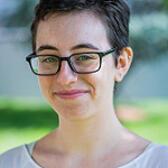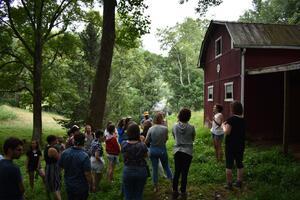#WeAreHere: Fighting Hate and Finding Home
A week ago on Shabbat, I found myself on a farm in western North Carolina with 28 other Southern Jews talking about white nationalist mushrooms.
I was sitting on a patch of grass at Yesod Farm and Kitchen, a teaching farm and spiritual center in Fairview, a small town in the Appalachian Blue Ridge Mountains. I was there for the #WeAreHere retreat, a training held by the social action organization Carolina Jews for Justice to teach community organizers from across North Carolina, Georgia, and Tennessee how to lead workshops on white supremacy, white nationalism, and antisemitism. Light stuff.
But I was also there in search of a home.
I move into my college freshman dorm in a few days and the university I’ll be attending has a Jewish population of just four percent. Although the school is large, the town is small and as such, the options for Jewish involvement aren’t overwhelming. There’s a Hillel chapter, sure, and a shul off campus, but when I spoke to friends of mine who already attend the school, their reports of religious activity were unenthusiastic and a little frustrated.
I’ve always drawn connections between my Judaism and my social activism, but I’ve rarely found communities where I can sit comfortably with both. Even in spaces like Carolina Jews for Justice where everything, including the name, is intent on finding and building bridges between those two worlds, I often discover one half falling back to make space for the other. There are protests, but no text studies; there are prayers, but no direct action.
As I sat in a folding chair in overgrown farm grass and listened to a woman explain prejudiced fungi, I whispered to myself a hope that this weekend would show me a new way.
The mushrooms were part of an extended metaphor that one of the facilitators of the workshop used to illustrate the difference between white supremacy and white nationalism. White supremacy, she explained, is the mycelium (that’s the root-like vegetative part of fungi that often grows underground) that spreads under the forest floor. It’s always there, a fertile foundation lurking under the soil. White supremacy preaches that while it’s fine that people of different backgrounds inhabit the United States, it is ultimately Christian white people that deserve complete and utter power. It’s systemic and institutionalized, a power structure imported from the days of European colonialism that still affects every aspect of day-to-day life.
White nationalism, on the other hand, like a mushroom, is not omnipresent. It requires a trigger, something to wake it up.
When it rains—when a racist, fear-mongering man is elected to an office that gives him unprecedented power to stoke hatred throughout the country—mushrooms spring up from the ground, from that mycelium, and surprise unsuspecting hikers. These fungi are the neo-Nazis and mass shooters we see in increasing numbers on the news. They’re not content to settle for political control. They want a white ethnostate; they want a complete exile, sometimes even elimination, of people of color, members of the LGBT community, and Jews, to name a few. White nationalism is not systemic like white supremacy. Instead, it’s a movement with organizers, propaganda, online radicalization processes, an agenda—efficient and spreading.
Hence, the white nationalist mushroom conversation.
But the weekend wasn’t focused entirely on Biology 101 metaphors. As the time went by, my hope for a space I could see myself in grew. This meeting of Jewish activists was proving to be deeply spiritual; it intertwined the urgency of social justice work in the American Southeast with the soul-stirring beauty of Shabbat prayers and communal song. One hour, we’d wrestle over the issue of being both targets of white nationalism as Jews and benefiting from white supremacy as white people. The next, we’d grapple with Torah portions that clashed with our modern beliefs. In between brainstorming sessions about workshops we could host in our own communities, we sang traditional gospels like “Let Your Little Light Shine.” We stared into the often terrifying face of our current political moment and still made space to love and support each other.
I spent three days connecting with driven, compassionate organizers, some of whom already live in the town I’m about to call home. Most of them don’t have ties to the university, but they’re doing the work I want to be doing, in a way that speaks to me spiritually, in a location I can access. I can organize with them. I can use the knowledge I gained about antisemitism and the threat of white nationalism. I can blend this knowledge together with the fierce strength of my faith, and I can go out into the world a stronger, braver fighter.
On Friday night, we all gathered in the farmhouse’s cramped dining room to light candles and eat. I was sandwiched tight against the wall, the edge of a dry erase board wedging itself into my shoulder blade. I was uncomfortable and my stomach was already growling. All I wanted was to rush through the Hebrew mumbo-jumbo and get to munching. But then we all started to sing.
My heart has rarely felt as full as it did that evening, in that tiny space, smushed between thirty Jews around a table laden with food, our eyes closed and our mouths open in a triumphant song that called out to those oppressed, lost, and hurting.
“Let your little light shine, let your little light shine, there might be someone down in the valley trying to get home…”
That weekend, I found my way home.







